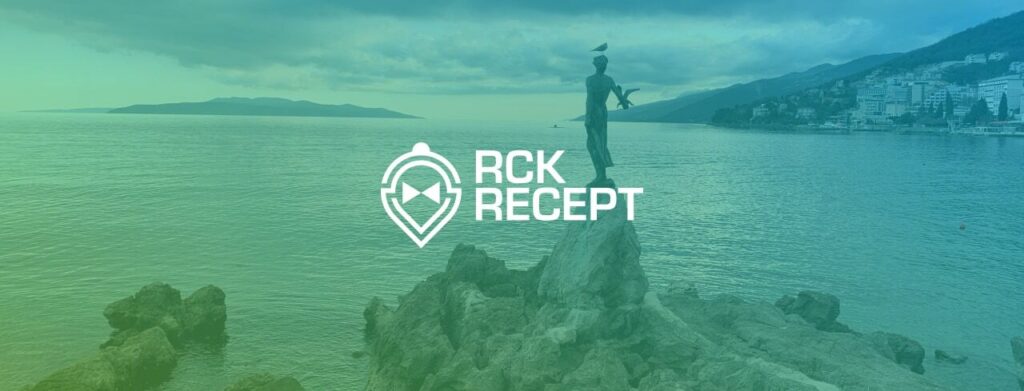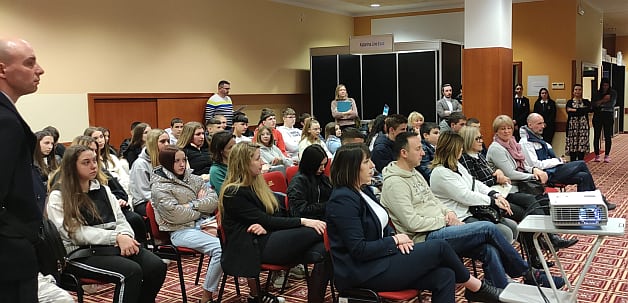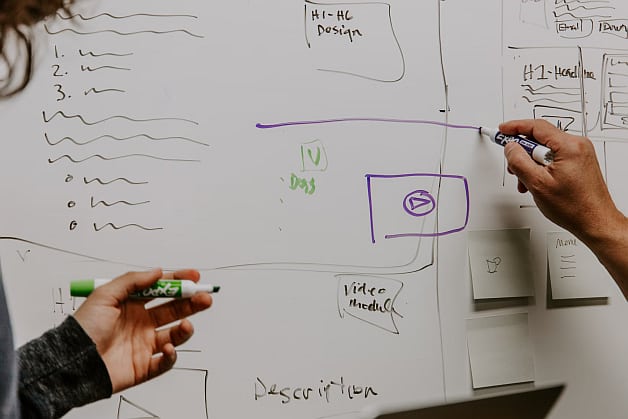Digital transformation insights, recommendations and lessons learned from the RCK RECEPT project
Dive into the transformative journey of digital solutions with Catering School Opatija. Uncover key lessons and strategic insights for the education and hospitality sectors.

Introduction
In our industry, partnerships between visionaries and experts often yield transformative results. Recently, we unveiled a comprehensive case study that showcased the dynamic collaboration between Point Jupiter and Catering School Opatija.
If you haven’t had a chance to explore it, you can catch up on the case study here.
Building on this foundation, we’re excited to present a reflective blog post that uncovers the lessons learned and offers strategic recommendations from this inspiring journey. By looking into these insights, we hope to outline the path forward for anyone navigating the ever-evolving landscape of digital transformation.
Background
By now, you might already be familiar with Catering School Opatija and their RCK RECEPT project.
Situated in Croatia’s scenic Opatija, Catering School Opatija embarked on a digital transformation journey aimed at creating its online presence and elevating its educational offerings. This endeavor transcended technical upgrades, bridging the gap between traditional education and modern digital engagement.

Rooted in a mission to foster innovation, vocational training, and lifelong learning, the institution sought to connect education with the private sector, educational institutions, local government, and the thriving tourism industry.
After we’ve gained significant experience and published our case study, we wanted to share with everyone our lessons learned and offer strategic recommendations for digital transformation projects in the educational and hospitality industry.
Lessons learned in digital transformation of hospitality and education
Let’s start with a basic overview of lessons learned. What follows is the general list of our lessons learned and after this list, we go into each of those lessons in more detail. We share some connections to our actual experience and then expand them to broader recommendations that are suitable for digital transformation projects in the edutech and hospitality industries.
- Holistic thinking paves the way
- Data-informed approach stands out
- User engagement is an ever-changing challenge
- Effective communication beats bureaucracy
- Stakeholder engagement boosts outcomes
- Unified CMS fuels consistency
- Preparation and adaptability are the two sides of the same coin
Holistic thinking paves the way for digital transformation
During the Catering School Opatija project, we observed the power of comprehensive planning. Not only did we focus on technical aspects, but also the educational nuances and the school’s broader vision. A similar holistic approach can guide educational institutions in understanding that transformation goes beyond just implementing new software — it’s about a total shift in how education is approached and delivered.
Data-informed approach stands out
We utilized both quantitative and qualitative data to drive our project forward. In the educational sector, harnessing classroom analytics, feedback, and performance metrics can illuminate strategies to enhance learning experiences. In our case, it helped us envision the entire gamification approach for the mobile app.
User engagement is an ever-changing challenge
Catering to students in the age of digital distractions (remember, you are competing for their attention and your competitors are TikToks and Instagrams of the world!) requires continuous innovation.
For educational platforms, it’s imperative to continuously update content and strategies, balancing educational rigor with interactive engagement tools that cater to the modern student’s digital-first expectations.
Effective communication beats bureaucracy
Our navigation of app store approvals emphasized the value of precise communication. For educators, clear communication can translate to smoother implementation of websites, mobile apps, online learning platforms, and collaborations with tech providers, and integration of new educational software.
Stakeholder engagement boosts outcomes
The collaboration’s true value emerged from the intertwined involvement of every stakeholder. Active client engagement, regular feedback loops, and a constant dialogue meant that the project always stayed aligned with its foundational goals.

Unified CMS fuels consistency
Centralizing content for the website and app ensured a consistent narrative. Educational institutions should aim for such unity, ensuring that course materials, announcements, and communications remain consistent across various digital touchpoints.
Preparation and adaptability are the two sides of the same coin
The digital realm of education, as well as the hospitality industry, is ever-evolving. Our experience underscored the importance of flexibility. Schools and universities must be ready to pivot their strategies based on student feedback, technological advances, or global events like the rapid shift to online learning during global crises.
Strategic recommendations for digital transformation
Following our lessons learned, let’s list out strategic recommendations for digital transformation projects in the educational and hospitality industry. After the list, we go into more detail for each of those.
- Embrace feedback and iteration
- Multilingual content elevates reach
- Adapt and innovate
- Training equals empowerment
- Analytics is the compass for the future
- Future-proofing is a deliberate process
Embrace feedback and iteration
During our journey with the Catering School Opatija, one guiding principle remained paramount: the user is the compass. Recognizing this, we proactively integrated feedback mechanisms within our digital solutions, a strategy that proved invaluable.
Feedback is more than just a mechanism to correct errors; it’s a goldmine of insights, a pulse check on the user experience, a roadmap for continuous improvement.
Discovery workshops
Before even a single line of code was written, our discovery workshops laid the foundation. These sessions allowed us to dive deep into the core requirements, expectations, and aspirations of the stakeholders. In the context of education, understanding pedagogical goals, student challenges, and educators’ pain points is crucial.
Similarly, in the hospitality sector, gauging the nuances of guest preferences or staff needs is vital. These workshops bridged the gap between our technical expertise and the school’s ground realities, ensuring alignment right from the get-go.
Co-creation and participatory design methods
We believe that the best solutions are crafted when stakeholders are involved in the creation process. By actively involving educators, students, and other staff in the design and development stages, we ensured that the solutions were tailored to real-world needs. This spirit of co-creation ensures that digital platforms are not just top-down implementations, but collective endeavors that resonate with the users they are intended for.

By adopting participatory design, we took co-creation a step further. It’s one thing to seek feedback and another to involve users in the actual process. Students, teachers, and administrative staff became an integral part of our participatory design methods approaches.
Our collaboration with the Catering School Opatija demonstrated the power of real-time user insights. In both the educational and hospitality sectors, consumer or student feedback is invaluable. It’s vital to set up feedback channels — be it for students in an e-learning platform or guests in a hotel reservation system — to continuously refine and enhance user experiences.
Multilingual content elevates reach
At its core, language is more than just a medium of instruction; it’s a bridge that connects cultures, eases communication, and enhances comprehension. In today’s interconnected world, where audiences span continents and cultures, it becomes imperative to cater to this diversity in a way that resonates.
This isn’t just about translation; it’s about contextualization. Translating course content, surveys, articles, press releases or any resources broadens accessibility, but adapting them to be culturally relevant enriches understanding.
Multilingual and localized content sends a clear message: “We understand and respect your background, and we’re here to serve you in a way that feels right at home.” It’s an investment that not only enhances user experience but also amplifies an institution’s or brand’s global reputation, setting them apart in a competitive landscape.
The diverse audience base we catered to underscored the significance of localization.
Educational platforms must consider translations and culturally relevant content.
Similarly, the hospitality industry, being inherently global, should localize guest experiences, from multilingual websites to culturally tailored amenities.
Adapt and innovate
The digital tools and platforms we integrated, such as the Flutter framework, signified the importance of leveraging the latest technologies. Both sectors should consistently scout for emerging technologies — be it AI-powered personalized learning in education or virtual hotel tours in hospitality.
Reflecting on our project, the integration of web and mobile platforms was key. Educational institutions must ensure that e-learning platforms sync seamlessly with grading or administrative systems. In hospitality, reservation systems, guest feedback platforms, and in-room digital services should offer a cohesive experience.
Training equals empowerment
Equip your team to handle evolving digital tools. This is as relevant for educators navigating a new e-learning software as it is for hotel staff managing a digital reservation system or using AI-based guest service tools.
For the Catering School Opatija project, it wasn’t just about delivering a digital solution; it was equally about ensuring that the staff and content editors were proficiently trained to navigate, manage, and optimize these platforms. This hands-on training was carefully and mindfully crafted, understanding that every member might be at a different level of digital proficiency. By walking them through each feature, addressing their concerns, and establishing a continuous feedback loop for post-training assistance, we bridged the potential digital divide.
This same principle rings true across sectors:
Educators and e-learning
Implementing an e-learning platform in an educational institution is only half the battle. Equipping educators to effectively use this software, from content uploads to student interactions, is pivotal. Regular training sessions, refreshers, and the inclusion of tech support can ease this transition, ensuring that educators focus on what they do best: teaching.
Hospitality and digital management
The hospitality industry is increasingly relying on digital tools – from AI-driven guest service solutions to sophisticated reservation management systems. But a system is only effective if the staff, be it the front desk or the kitchen, understand its operations. Tailored training sessions that cater to the unique demands of each department, and the continuous availability of tech support, can ensure smooth operations.
Content editors and platform mastery
Content drives engagement, and editors are at the helm of this engagement. For the Catering School Opatija, we understood that the platform’s effectiveness would be maximized only if the editors, who regularly updated content, were comfortable with the system. Customized training sessions were, therefore, imperative. Whether it’s posting a new article, updating a quiz, or making backend changes, when editors are empowered with knowledge, they can maximize the platform’s potential.
Analytics is the compass for the future
Our project thrived on data-informed insights. For educational platforms, analytics can highlight student engagement patterns or areas of struggle. In hospitality, understanding guest preferences and behaviors can lead to more personalized guest experiences and increased loyalty.
In any transformative journey, having a roadmap is pivotal. For digital projects, especially ones that touch upon dynamic sectors like education and hospitality, analytics serve as this roadmap, guiding decisions, highlighting opportunities, and even forewarning of potential pitfalls.
The success of our collaboration with the Catering School Opatija wasn’t solely based on the innovative tools and solutions we implemented. A significant part of the magic lay beneath, in the heaps of data we continuously gathered, (or even modeled) analyzed, and acted upon. By being data-informed, our strategies were always rooted in reality, taking into account real user behavior and preferences.

In essence, analytics isn’t just about numbers and graphs; it’s about stories. Stories of user behavior, preferences, challenges, and desires. By tuning into these stories, institutions and businesses can make decisions that are not just informed, but inspired. As we chart the path forward in an increasingly digital world, let analytics be our compass, guiding us towards success and innovation.
Future-proofing is a deliberate process that understands tradition and digital transformation needs
Standing still is the fastest way to get left behind. However, in our zeal to embrace the new, we should never lose sight of the time-tested values and practices that form the bedrock of industries, especially those as personal as education and hospitality.
Our partnership with the Catering School Opatija was a testament to this philosophy. While we seamlessly integrated state-of-the-art digital tools and platforms, the true North Star of our initiative was ensuring that these solutions were both scalable and adaptable. But why is this adaptability so crucial?
Our solutions were designed to scale and adapt. Educational platforms must be robust enough to accommodate increasing numbers of students or courses. Hotels and restaurants, as they expand or refine services, should choose digital systems that can grow with them, without needing frequent overhauls.
While we incorporated cutting-edge digital solutions for the Catering School Opatija, the essence of traditional hospitality or foundational education shouldn’t be lost. Balance is key. For instance, while a hotel might use AI for room service requests, personal human touches in guest interactions remain irreplaceable.
What’s next?
Our journey alongside the Catering School Opatija stands as a testament to the transformative power of thoughtful digital solutions in both the educational and hospitality sectors. At the heart of this transformation lies a deep commitment to understanding user needs, embracing iterative feedback, and staying ahead of technological advancements.
As we’ve seen, a holistic strategy—one that marries technical prowess with an acute understanding of the industry’s nuances—yields results that are both impressive and sustainable.
However, it’s crucial to remember that digital transformation isn’t a one-off event—it’s an ongoing journey. To traverse this evolving landscape of digital transformation effectively, insights gleaned from our experiences can be instrumental. From the imperative of multilingual content to the centrality of user feedback and the power of data analytics, our lessons and recommendations outline a roadmap not just for now, but for the future.
As you chart your own path forward, know that you don’t have to do it alone. Whether you’re in the embryonic stages of digital strategy planning or looking to refine your existing platforms, our team at Point Jupiter stands ready to guide, collaborate, and innovate with you. Together, we can craft digital experiences that not only meet current demands but also anticipate and shape the future.
Ready to transform your digital strategy? Dive into a partnership with Point Jupiter and let’s co-create solutions that resonate, inspire, and deliver. Reach out to us today and let’s embark on your next digital adventure together.